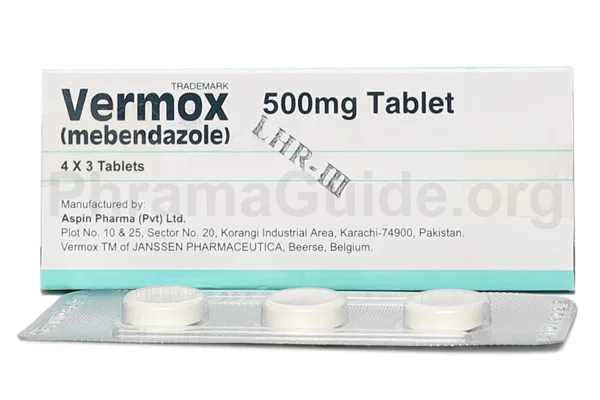Vermox tablet is an anthelmintic medication used for the treatment of infections caused by parasitic worms. It is effective against various types of intestinal helminths (worms). Following are some common uses of Vermox Tablet:
1. Intestinal Worm Infections: Vermox tablet is commonly used to treat infections caused by intestinal worms, including:
- Pinworms (Enterobius vermicularis): Vermox tablet is highly effective in eradicating pinworm infections, which are a common cause of anal itching, especially in children.
- Roundworms (Ascaris lumbricoides): Vermox tablet is also effective in treating infections caused by roundworms, which can lead to abdominal pain, vomiting, and malnutrition.
- Hookworms (Ancylostoma duodenale and Necator americanus): Vermox tablet is used to treat infections caused by hookworms, which can cause anemia, abdominal pain, and gastrointestinal disturbances.
- Whipworms (Trichuris trichiura): Vermox tablet is used to treat whipworm infections, which can lead to abdominal pain, diarrhea, and weight loss.
2. Threadworm Infections: Vermox tablets can also be used to treat infections caused by threadworms (Strongyloides stercoralis). These infections can lead to symptoms such as abdominal pain, diarrhea, and skin rashes.
3. Strongyloidiasis: Vermox tablets may be used for the treatment of strongyloidiasis, an infection caused by the parasitic worm Strongyloides stercoralis. This infection typically affects the intestines but can sometimes spread to other organs and cause severe complications, particularly in immunocompromised individuals.
4. Other Parasitic Infections: Vermox tablets can also be used for the treatment of certain other parasitic infections, such as trichostrongyliasis, ancylostomiasis, and necatoriasis.
Off-label Uses of Vermox Tablet
- Cancer Treatment: Vermox tablets may have anticancer effects by inhibiting various cellular processes, including angiogenesis (formation of new blood vessels), cell division, and tumor growth.
- Anti-Parasitic Combination Therapy: Vermox tablet has been used off-label as part of combination therapy for certain parasitic infections, especially those caused by protozoa. Combining Vermox with other medications, such as metronidazole, has shown improved efficacy in treating certain parasitic infections like giardiasis and trichomoniasis.
- Polycystic Kidney Disease (PKD): Vermox tablet is used as a potential treatment for polycystic kidney disease, a genetic disorder characterized by the growth of multiple cysts in the kidneys. It inhibits cyst growth and improves kidney function.

What is Vermox?
Vermox is one of the leading brands of Mebendazole, manufactured and marketed by Aspin Pharma (Pvt) Ltd, Pakistan. Under the licenses of Janssen Pharmaceutica, Belgium.
Vermox Alternatives : Other Similar Brands
The following are some alternative brands of Vermox and their manufacturers.
- Deworm : Merck (Pvt) Ltd.
- Nemazole : GlaxoSmithKline (GSK).
- Vermacid : Wilsons Pharmaceuticals, Pakistan.
- Vermol : W.Woodward Pakistan (Pvt) Ltd.
- Zeworm : Wilshire Laboratories (Pvt) Ltd, Pakistan.
- Erizole : Efroze Chemical Industries (Pvt) Ltd, Pakistan.
- Belmentic : Paramount Pharmaceuticals, Pakistan.
- Geozole : Geofman Pharmaceuticals, Pakistan.
- G-Worm : Olive Laboratories, Pakistan.
- Mebnagen : Genera Pharmaceuticals, Pakistan
Vermox : Available Formulations and Strengths
Presently, Vermox is available in Tablet and Syrup forms with the following strengths.
Vermox Tablet : 100mg and 500mg strengths.
Vermox Syrup : 100mg/5ml strength.
Who Should Not Use Vermox?
Despite the potential benefits of Vermox uses discussed above, there are several contraindications that must be taken into consideration before beginning a course of treatment:
Hypersensitivity or Allergy: Vermox should not be used in individuals who have a known hypersensitivity or allergy to the medication or any of its components.
Pregnancy and Lactation: Vermox is generally contraindicated during pregnancy, especially during the first trimester. There is limited data on its safety during pregnancy, and it is typically avoided unless the benefits outweigh the risks. Vermox is also not recommended during breastfeeding, as it can pass into breast milk.
Severe Hepatic Dysfunction: Vermox is primarily metabolized in the liver, and its use is contraindicated in individuals with severe hepatic dysfunction. The drug may have the potential to further impair liver function or cause hepatotoxicity in these cases.
Children Under 2 Years: Vermox is generally not recommended for use in children under the age of 2 years, as safety and efficacy data in this age group are limited.
Concurrent Metronidazole Use: Vermox should not be used concurrently with metronidazole, another medication commonly used for parasitic infections. This combination can increase the risk of neurotoxicity.
Intestinal Obstruction: Vermox is contraindicated in individuals with suspected or known intestinal obstruction due to the potential risk of worsening the condition.
What is the Recommended Daily Dosage of Vermox?
Vermox Dose for Intestinal Worm Infections:
- Adults and children over 2 years of age: One tablet of 100mg taken twice daily for three consecutive days. In some cases, a single dose of one tablet of 500mg may be prescribed.
Vermox Dose for Threadworm Infections:
- Adults and children over 2 years of age: One tablet of 100mg. In some cases, a repeat dose may be necessary after two to four weeks.
Vermox Dose for Strongyloidiasis:
- Adults and children over 2 years of age: One tablet of 100mg taken twice daily for three consecutive days.
How Vermox Works?
Vermox works by interfering with the microtubule structure in the cells of parasitic worms, leading to their immobilization and eventual death.

Leave A Comment